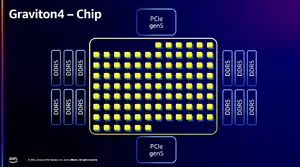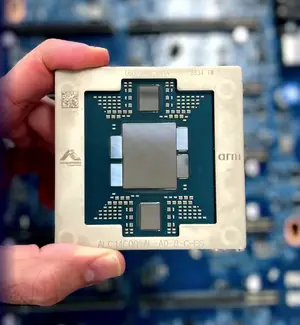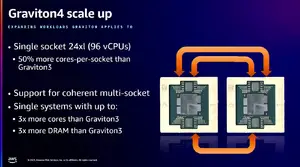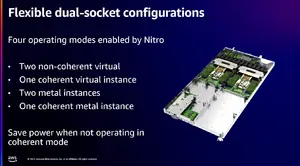| Edit Values | |
| AWS Graviton4 | |
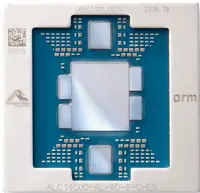 | |
| Graviton4 Package Front | |
| General Info | |
| Designer | Annapurna Labs |
| Manufacturer | TSMC |
| Model Number | ALC14C00 |
| Part Number | ALC14C00 |
| Market | Server |
| Introduction | November 28, 2023 (announced) November 28, 2023 (launched) |
| General Specs | |
| Family | Graviton |
| Frequency | 2.8 GHz |
| Microarchitecture | |
| ISA | ARMv9.0-A (ARM) |
| Microarchitecture | Neoverse V2 |
| Core Name | Neoverse V2 |
| Process | 4 nm |
| Technology | CMOS |
| MCP | Yes (7 dies) |
| Word Size | 64 bit |
| Cores | 96 |
| Threads | 96 |
| Multiprocessing | |
| Max SMP | 2-Way (Multiprocessor) |
| Interconnect | CCIX |
| Interconnect Links | 3 |
| Succession | |
AWS Graviton 4 (Alpine ALC14C00) is a hexanonaconta-core ARMv9 multiprocessor designed by Amazon (Annapurna Labs) for Amazon's own infrastructure.
Graviton 4 is a 5 nm 7-chiplet design SoC based on the Arm CMN-700 mesh interconnect and Neoverse V2 microarchitecture.
- This chip supports dodeca-channel DDR5-5600 ECC memory along with 96 lanes of PCIe 5.0.
- See also: Annapurna Labs and Neoverse
Overview[edit]
This 4th-generation server processor was first announced during Amazon's AWS re:Invent 2023 by Adam Selipsky in his keynote. The general rollout for the Graviton 4 chip in the AWS data center occurred in early 2024. These processors are offered as part of Amazon's EC2 instances.
Graviton 4 features a 7-chiplet design similar to its predecessor, Graviton 3. This chip features 96 cores, 50% more than the prior generation. The core implementation was updated to Arm's Neoverse V2 microarchitecture with 4x 128b SVE support, also bringing support up to Armv9.0 ISA for the first time. The chip supports up to 12 channels for DDR5 ECC DIMMs with data rates of up to 5600 MT/s. The Graviton 4 tripled the number of PCIe lanes to 96 lanes of PCIe 5.0.
The Graviton 4 is the first chip from the Graviton family to feature multiprocessing support. The chip introduced dual-socket support with full coherency for up to 192 vCPUs and DDR5 channels on a single server. The Graviton 4 also expanded encryption support to the new multi-socket coherency links as well as to the Nitro cards interfaces. The full platform can be configured to run in a number of modes that can potentially offer additional power saving: two non-coherent virtual systems, one coherent virtual system, two metal systems, or one metal system.
Packaging[edit]
The Graviton 4 features a 7-chiplet architecture similar in design to the Graviton 3. The compute SoC die sits in the middle with DDR memory controller dies and 2 PCIe controller dies. Each DDR memory controller features support for 3 memory channels - two dies to the east and two dies to the west for a total of 6 memory channels on each side. There are two PCIe controller dies - one to the north and one to the south of the chip.
The four DDR memory controller dies are interconnected with the SoC via embedded silicon bridges in the package. Unlike the Graviton3, the two PCIe controller dies are not abutting the compute SoC die and are no longer controller via an embedded bridge in the package.
Cache[edit]
- Main article: Neoverse V2 § Cache
|
Cache Organization
Cache is a hardware component containing a relatively small and extremely fast memory designed to speed up the performance of a CPU by preparing ahead of time the data it needs to read from a relatively slower medium such as main memory. The organization and amount of cache can have a large impact on the performance, power consumption, die size, and consequently cost of the IC. Cache is specified by its size, number of sets, associativity, block size, sub-block size, and fetch and write-back policies. Note: All units are in kibibytes and mebibytes. |
|||||||||||||||||||||||||
|
|||||||||||||||||||||||||
Memory controller[edit]
|
Integrated Memory Controller
|
||||||||||||
|
||||||||||||
Expansions[edit]
|
Expansion Options
|
||||||||
|
||||||||
Models[edit]
- Graviton 1: 16 nm, 16× Cortex-A72 (ARMv8), @2.3GHz, a1.metal (Q4 2018)
- Graviton 2: 7 nm, 64× Neoverse N1 (ARMv8.2-A), 8× DDR4-3200, 2.5GHz, PCIe 4.0, r6g.metal (Q4 2019)
- Graviton 3: 5 nm, 64× Neoverse V1 (ARMv8.4-A), 8× DDR5-4800, 2.6GHz, PCIe 5.0, r7g.metal (Q4 2021)
- Graviton 4: 4 nm, 96× Neoverse V2 (ARMv9.0-A), 12× DDR5-5600, 2.8GHz, PCIe 5.0, r8g.metal-24xl (Q4 2023)
| Has subobject "Has subobject" is a predefined property representing a container construct and is provided by Semantic MediaWiki. | AWS Graviton4 - Annapurna Labs (Amazon)#io + |
| base frequency | 2,800 MHz (2.8 GHz, 2,800,000 kHz) + |
| core count | 96 + |
| core name | Neoverse V2 + |
| designer | Annapurna Labs + |
| die count | 7 + |
| family | Graviton + |
| first announced | November 28, 2023 + |
| first launched | November 28, 2023 + |
| full page name | annapurna labs/graviton/graviton4 + |
| has ecc memory support | true + |
| instance of | microprocessor + |
| is multi-chip package | true + |
| isa | ARMv9.0-A + |
| isa family | ARM + |
| l1$ size | 12,288 KiB (12,582,912 B, 12 MiB) + |
| l1d$ size | 6,144 KiB (6,291,456 B, 6 MiB) + |
| l1i$ size | 6,144 KiB (6,291,456 B, 6 MiB) + |
| l2$ size | 192 MiB (196,608 KiB, 201,326,592 B, 0.188 GiB) + |
| ldate | November 28, 2023 + |
| main image | 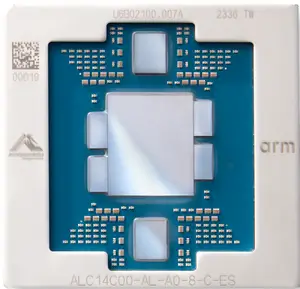 + + |
| main image caption | Graviton4 Package Front + |
| manufacturer | TSMC + |
| market segment | Server + |
| max cpu count | 2 + |
| max memory bandwidth | 500.679 GiB/s (512,695.313 MiB/s, 537.6 GB/s, 537,600 MB/s, 0.489 TiB/s, 0.538 TB/s) + |
| max memory channels | 12 + |
| max pcie lanes | 96 + |
| microarchitecture | Neoverse V2 + |
| model number | ALC14C00 + |
| name | AWS Graviton4 + |
| part number | ALC14C00 + |
| process | 4 nm (0.004 μm, 4.0e-6 mm) + |
| smp interconnect | Cache Coherent Interconnect for Accelerators (CCIX) + |
| smp interconnect links | 3 + |
| smp max ways | 2 + |
| supported memory type | DDR5-5600 + |
| technology | CMOS + |
| thread count | 96 + |
| word size | 64 bit (8 octets, 16 nibbles) + |
